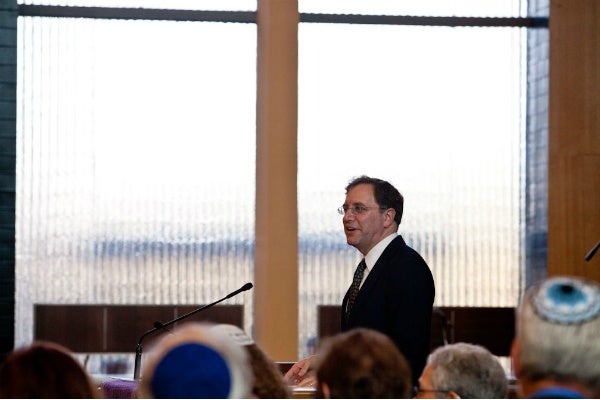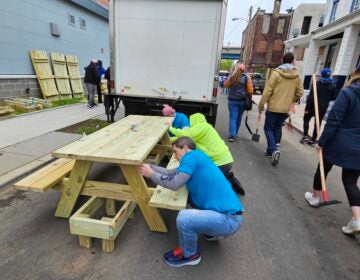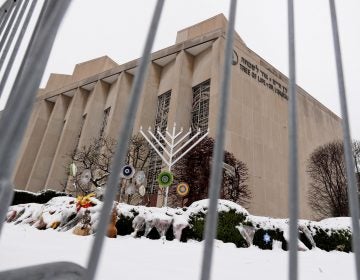Philly-area synagogues grapple with safety in the aftermath of Pittsburgh shooting
The shooting comes amid a rise in anti-Semitic incidents across the U.S.
Listen 0:59
Rabbi Adam Zeff of Germantown Jewish Centre. (Brad Larrison for WHYY)
The Germantown Jewish Centre is considering changing its open-door policy during services.
Protocol requiring doors to stay locked during school hours may also become rule for other events. Armed off-duty police officers hired as security for the High Holy Days of Rosh Hashanah and Yom Kippur may find more work securing other services.
“This is on a different level for us,” said Adam Zeff, rabbi of GJC in Northwest Philadelphia. “We’re thinking about it differently now with more urgency and more worry.”
The centre is in company with synagogues across the nation, who are shaken after Robert Bowers allegedly entered Tree of Life synagogue in Pittsburgh’s Squirrel Hill neighborhood and began shooting at a group of worshipers, killing 11 people and wounding six. Four were police officers.
With Bowers, 46, in custody, and the lives of those lost being mourned, Jewish leaders are left grappling with what it means to be open and welcoming, yet secure.
“It is a sad and unfortunate necessity,” said Rabbi Deborah Glanzberg-Krainin, chief program and strategy officer at the Jewish Federation of Greater Philadelphia.
“As a religious community, we can’t completely shut down,” she said. “We have to have open tents and at the same time, we have to take care of everybody, both the Jewish people and the people that come into our houses of worship who may not be Jewish.”
Bowers frequently posted anti-Semitic comments and memes on the Philadelphia-based “free speech” social networking site, Gab. After opening fire with an AR-15 rifle and other weapons during worship services inside Tree of Life Synagogue, he expressed hatred of Jews and later told police that “all these Jews need to die,” authorities said.
The shooting comes amid a rise in anti-Semitic incidents across the U.S.
An audit by the Anti-Defamation League found the number of assaults, harassment, and vandalism increased by 57 percent between 2016 and 2017, the widest single-year margin in almost four decades.
Each state had at least one incident, with Pennsylvania among the top six. The commonwealth accounted for 96 acts of harassment and vandalism toward Jews, up 43 percent from 2016.
“The political divide in this country has become so toxic and, when combined with the normalization of this type of hate speech and anti-Semitism, has really led to a volatile atmosphere that we’ve seen play out just in the past week,” George Selim, senior vice president for programs with the Anti-Defamation League, told NPR Sunday.
The GJC has been spared from this hateful wave, said Zeff. In the past, however, the congregation has been the target of anti-Semitic graffiti and a suspicious fire.
Zeff says the acts were disturbing, but they’re incomparable to what is being deemed as “the deadliest attack on the Jewish community in the history of the United States.”
“It’s not that those things didn’t disturb us,” he said, “They disturbed us a lot,” but the shooting in Pittsburgh “takes the ground out from under our feet.”
—
The Associated Press contributed to this report.
WHYY is your source for fact-based, in-depth journalism and information. As a nonprofit organization, we rely on financial support from readers like you. Please give today.





